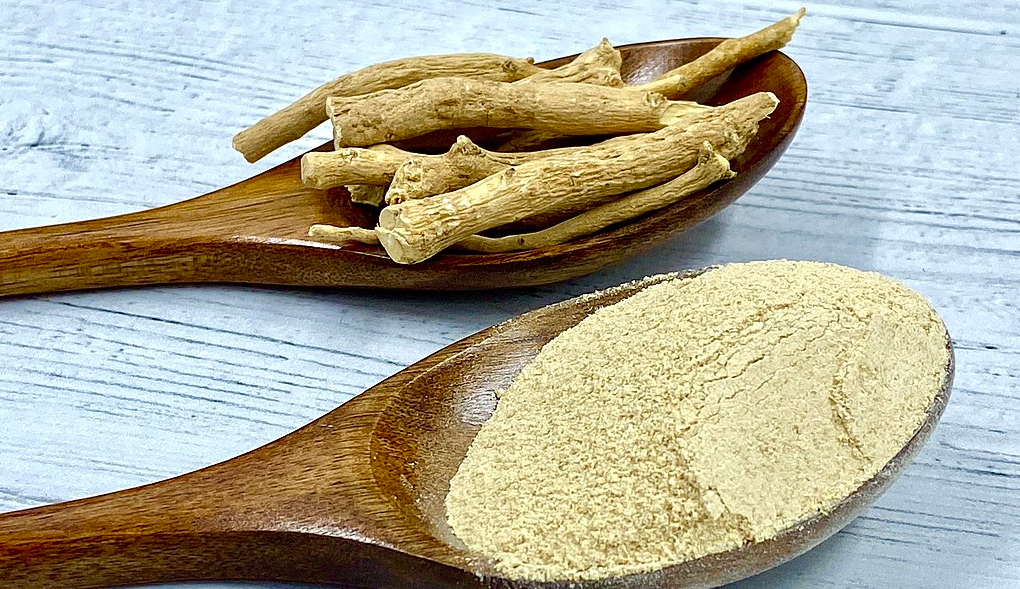Ashwagandha super herb is widely known for its countless health benefits, including:
- reducing stress and anxiety
- improving brain function
- fighting depression
- combating inflammation
- fighting cancerous tumors
- relieving arthritis
- combating infectious diseases
[Post updated June 8, 2023]

formulatehealth, CC BY 2.0, via Wikimedia Commons
1. Ashwagandha Click to listen highlighted text! Ashwagandha super herb reduces stress and cortisol levels
Stress can sneak up on you, leaving you feeling overwhelmed and drained. Fortunately, the compounds found in Ashwagandha, known as adaptogens, can help provide some relief.
These miraculous molecules have been shown to increase the body’s resistance to stress while simultaneously reducing stress hormones like cortisol.
Not only that, but studies have shown that regular consumption of Ashwagandha can enhance memory, reaction time, and cognitive function.
Additionally, it has been known to boost the immune system, which helps protect against several diseases and infections.
With so many proven health benefits, it is no surprise that Ashwagandha has become a popular supplement for many people looking to improve their overall health and well-being.
2. Improves Brain Function!
Ashwagandha is one of the most underrated yet powerful herbs in Ayurvedic medicine, known for its ability to improve brain function — taken daily enhances memory, reaction time, and cognitive function.
This ancient herb, also known as Indian ginseng, has been used for centuries to treat various ailments, but recent studies have shown that it has a profound effect on cognitive function.
It can improve memory and focus, reduce stress and anxiety, and even boost brain function in people with Alzheimer’s disease and other forms of dementia.
Its unique combination of withanolides, alkaloids, and flavonoids work together to protect brain cells from damage and improve overall cognitive function.
Incorporating this super herb into your daily routine can make a noticeable difference in your mental clarity and overall well-being.
3. For Depression
Depression can be an all-consuming, exhausting struggle that feels like an insurmountable mountain to climb.
While there are many potential treatments out there, some people want a more natural approach. In that case, they might want to consider trying ashwagandha.
Known for its ability to reduce stress and anxiety, ashwagandha has also been found to help those suffering from depression.
By reducing cortisol levels, the hormone that can cause anxiety, ashwagandha can help improve symptoms of depression, allowing for a more balanced and happier life.
While it’s always important to seek professional help if you’re struggling with depression, ashwagandha might just be the extra boost you need to start feeling better.
4. Combats inflammation in the body
One of Ashwagandha’s most promising benefits is its ability to combat inflammation, which is responsible for a host of health problems.
Inflammation, while typically associated with pain or discomfort, is actually a natural response by the body to protect itself from harmful stimuli such as pathogens, irritants, or damaged cells.
The effects of inflammation on the body can manifest in various ways, depending on the source and extent of the response.
For example, inflammation…
- of the skin can show up as redness, swelling, or heat
- in lungs can cause shortness of breath or coughing
- of joints can cause pain and stiffness
Chronic, low-level inflammation has been linked to a variety of diseases including heart disease, diabetes, and cancer.
Overall, while inflammation plays an essential role in the body’s defense mechanisms, it’s also essential to manage it appropriately to avoid potential harm. Inflammation occurs when your body’s immune system is triggered, and can be caused by a variety of factors such as stress, poor diet, or infections.
By taking ashwagandha supplements or including it in your daily routine, you can potentially reduce inflammation – and in turn, improve your overall health and well-being.
More applications for this Ashwagandha super herb!
Health applications for ashwagandha in traditional Indian and Ayurvedic medicine are extensive. Of particular note is its use against cancerous tumors, arthritis, and a wide range of infectious diseases.
5. Cancerous Tumors
Ashwagandha has been found to have powerful properties in the fight against tumors.
For centuries, Ayurvedic healers have recognized and harnessed the plant’s medicinal qualities to aid in the treatment of various illnesses, including cancer.
Recent studies reveal that ashwagandha possesses potent anti-cancer properties that effectively counteract tumors.
These findings have generated excitement in the field of medicine and contributed to an increased interest in the use of ashwagandha as a natural alternative to traditional cancer treatments.
Moreover, the herb is lauded for its versatility and ability to treat numerous ailments, making it a valuable addition to the medicinal repertoire of holistic healthcare practitioners.
6. Arthritis
The bioactive components found in Ashwagandha helps relieve inflammation in the body, which is the root cause of arthritis.
Studies have shown that this herb can significantly reduce joint pain, swelling, and stiffness in people with osteoarthritis and rheumatoid arthritis.
With its natural healing potential, Ashwagandha can be a game-changer for those seeking a holistic and drug-free approach to managing arthritis.
7. Infections Diseases
This medicinal herb is known for its remarkable effects in combating infectious diseases.
From respiratory problems to skin infections, Ashwagandha has proven to be effective in boosting the immune system, providing relief and promoting recovery.
Not only does it possess antiviral and antibacterial properties, but it also has anti-inflammatory properties, making it an ideal remedy for treating inflammation.
Amidst the current global health crisis, it is no wonder that more and more people are turning to this natural healing alternative to keep their bodies strong and resistant to infections.
Ashwagandha super herb is in the pepper family
It is found in India and Africa. The roots are used medicinally.
Botanical name: Withania somniferum. AKA Wild Cherry.

Source:
Dinesh Valke
Ashwagandha has been used in connection with Immune function, osteoarthritis and stress.
The shoots and seeds are also used as food and to thicken milk in India.
Traditional uses, among tribal peoples in Africa, include fevers and inflammatory conditions. It is frequently a constituent of Ayurvedic formulas, including a relatively common one known as shilajit.
Active constituents:
The constituents believed to be active in ashwagandha have been extensively studied. Compounds known as withanolides are believed to account for the multiple medicinal applications.
These molecules are steroidal and bear a resemblance, both in their action and appearance, to the active constituents of Asian ginseng (Panax ginseng) known as ginsenosides.
Indeed, ashwagandha has been called “Indian ginseng” by some. Its withanolides have been extensively researched in a variety of animal studies examining effects on immune function, inflammation, and even cancer.
This herb stimulates the activation of immune system cells, such as lymphocytes.
It has also been shown to inhibit inflammation and improve memory in animal experiments.
Taken together, these actions may support the traditional reputation as a tonic or adaptogen – an herb with multiple, nonspecific actions that counteract the effects of stress and generally promote wellness.
Ashwagandha Super Herb Usage Recommendations:
Some experts recommend 3–6 grams of the dried root, taken each day in capsule or tea form.
To prepare a tea, 3/4–1 1/4 teaspoons (3–6 grams) of the root are boiled for 15 minutes and cooled; 3 cups (750 ml) may be drunk daily.
Alternatively, tincture 1/2–3/4 teaspoon (2–4 ml) three times per day, is sometimes recommended.
I love this herbal supplement so much I don’t ever want to run out. So, I just found and bought two bottles of organic liquid drops so I don’t have to take so many pills per day. I take 15 drops of this ashwagandha root liquid every the morning, and the same if I need a “pick me up” in the afternoon. You can take it as much as three times a day safely.
I haven’t tried it at bedtime yet, but it is considered a sleep aid, as well. (Will advise when and if I try it for that, but I sleep pretty well these days!)
Side Effects of Ashwagandha
No significant side effects have been reported The herb has been used safely by children in India. Its safety during pregnancy and breastfeeding is unknown. At the time of writing, there were no well-known drug interactions.
You might also be interested in natural ways to improve your memory or Rhodiola, which not only increases cognitive functions, but also reduces anxiety and elevates energy.
